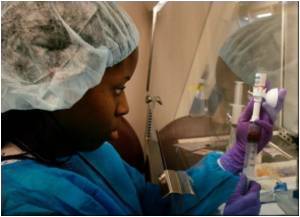
Zudaire and colleagues developed a phenotypic, high-content, cell-specific fluorescence platform that examines the effectiveness of angiogenesis inhibitors, which shut down or impede tumor growth by hampering blood vessel formation and thus starve the tumor.
Past research has mainly focused on identifying single molecular targets for angiogenesis inhibitors. The new phenotypic platform evaluates how angiogenic inhibitors affect simultaneously entire cells and several steps of the angiogenesis process.
"If you do a screening for activity of a particular enzyme, that's all you're going to get: a drug that targets that specific enzyme activity. That tells you little about how the enzyme works in a complex organization," said Zudaire. As a result, he explained, when many of these drugs advance to phase 2 clinical trials, they are either ineffective or result in side effects that are toxic to the patient.
Researchers validated the platform by screening the 1,970 small molecules that are part of the National Cancer Institute Developmental Therapeutics Program Diversity Set. Through the phenotypic platform, they identified more than 100 lead compounds that were then tested in preclinical models. All tested compounds showed antitumor activity, and some blocked tumor growth more effectively than current, FDA-approved antiangiogenic drugs.
This screening platform also ensures that researchers do not precondition the system to a known target. "We sometimes assume we know a lot about how these tumor systems work and what we should target," said Zudaire.
Advertisement
Ultimately, using this type of phenotypic platform can make drug development more efficient and cost-effective.
Advertisement
Source-Eurekalert















